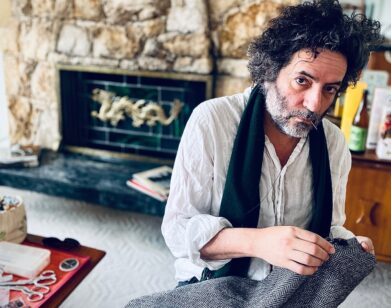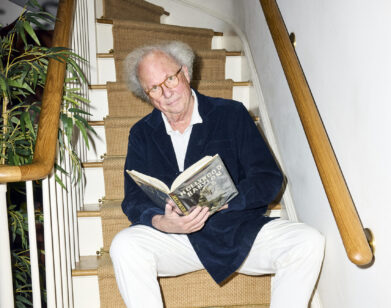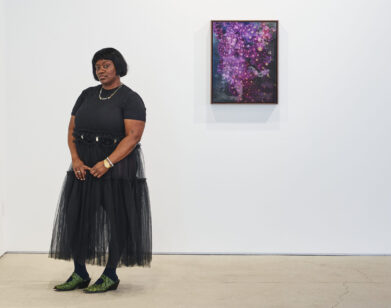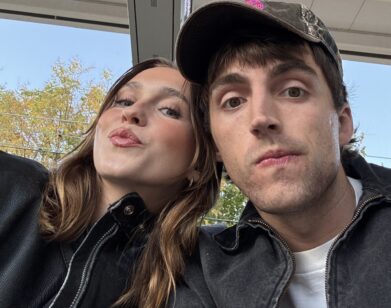Gina Tron’s Search For Support

Gina Tron’s memoir You’re Fine (Papercut Press) is a revealing, raging descent into madness. When Tron checks herself into a mental health facility, she is battered and addicted seeking the help she does not find from friends and family. But what she finds instead is poorly staffed and apathetic environment where patients flout the rules and staff turn a blind eye. Yet, in the midst of chaos, Tron is able to build friendships and make some deep insights into her past and the forces that first drove to escape her small Vermont home town for New York City and finally pushed out of her control. Vibrant, darkly funny, and courageously candid Tron has written about losing your mind and then reclaiming it in psychedelic, poetic prose. We spoke with Tron about mental institutions, addicted, escape, family and how we are all a little mad.
ROYAL YOUNG: You checked yourself into a mental institution. You were asking for help from people in your life and not getting it. What is that life?
GINA TRON: It’s probably one of the worst feelings ever. If you’re not in a bad spot, you think if something was to happen you could look for help and get it. That’s a comforting feeling. When you actually are stuck and that doesn’t happen it’s devastating. I started to think of myself as having less value than others. I think that’s something that happens to people who struggle with addiction a lot. Once you admit you are doing drugs people put less worth in you. You’re a junkie forever.
YOUNG: We’re so quick now to minimize addiction in a way, because people are addicted to everything.
TRON: Yeah. I agree.
YOUNG: It’s kind of weird.
TRON: I think we’re in the dark ages about understanding addiction. In one way, we’re so quick to say it’s an addiction problem even if they just like doing something. Understanding what makes someone an addict is important. People who have eating disorders look down on people who use heroin. Addiction is something that makes you feel good or distracts you from life. We’re just animals forced to cope with a really stressful life. People like to look at addicts as weak and selfish, they think they can’t be trusted. There are different kinds of addicts; some people are just sad. Sometimes it’s chemical.
YOUNG: I love alcohol and think a lot of it is about escape for me. A reunion with your past set you off. Why did you want to escape your past?
TRON: I was very shy when I was younger. I became more comfortable on drugs in the beginning. I didn’t want to be a socially inept person. Moving to New York from Vermont I made a lot of friends. But I still felt lonelier than when I was a social outcast.
YOUNG: Why?
TRON: I still kind of hated myself.
YOUNG: Is escape something you chase?
TRON: Definitely. I’ve always been an escapist, not coping with a lot of things like my mom’s death and my family. That inhibited me from seeking out help. It was an accumulative thing and I became detached from my life. Going back to my hometown was a huge trigger. Everyone wants a place they can call home, and I used to feel that way about it, which is why I wanted to go back. But at the same time, it was horrifying. [laughs]
YOUNG: What were some things that surprised you about making a serious step towards feeling better?
TRON: I was surprised how hard it was to get help. I’m pretty articulate, I can only imagine how hard it would be for someone who was living in poverty and schizophrenic to get help. I was horrified. I always imagined if you committed yourself to a psych ward, there would be a psychiatrist to listen to you and try to help you. Maybe that was narcissistic. But that was the one thing I needed. Just to sit down with someone and have them ask, “What is going on?” That was hard to get. Pharmaceuticals were not hard to get. They were the first,and only thing that was going on there. I saw how bad the mental health system in America is and I was so disappointed. People not being watched or taken care of, people who are not well being molested by other patients and the guard just watches. People go in sick but it is just making them sicker.
YOUNG: Unfortunately I think that’s often what happens in a lot of institutions. Even rehab and jail, you go in for smoking too many joints and you come out with a heroin problem or you go in for stealing cars and come out robbing banks.
TRON: Totally. It trains you how to be a criminal. It’s like being sent to criminal training camp.
YOUNG: So crazy. Was being confessional in your writing a form of therapy?
TRON: Definitely. I’m very lucky I have writing—if I didn’t start writing about it I don’t know what would have happened. I was so mad at that time and so mad when I started writing this book. I was so angry I knew I had to find a voice in writing to call out some of the stuff that goes on in institutions. I didn’t know what else to do.
YOUNG: Do you view life as a continuous creative process?
TRON: Yeah, I think people are always evolving and changing. When I look back at stuff I wrote two years ago, it’s less structured and more angry. Lately, I’ve been more comfortable and accepting of how the world is. I’ve removed all the bad emotions I had in the beginning and put in more facts, put in my own flaws. I contributed and put myself in crazy situations. But being an addict doesn’t make you less human. We all feel isolated sometimes.
YOUNG: And we’re all a little mad [laughs]
TRON: [laughs] Yes, we are.
YOU’RE FINE IS OUT NOW.






